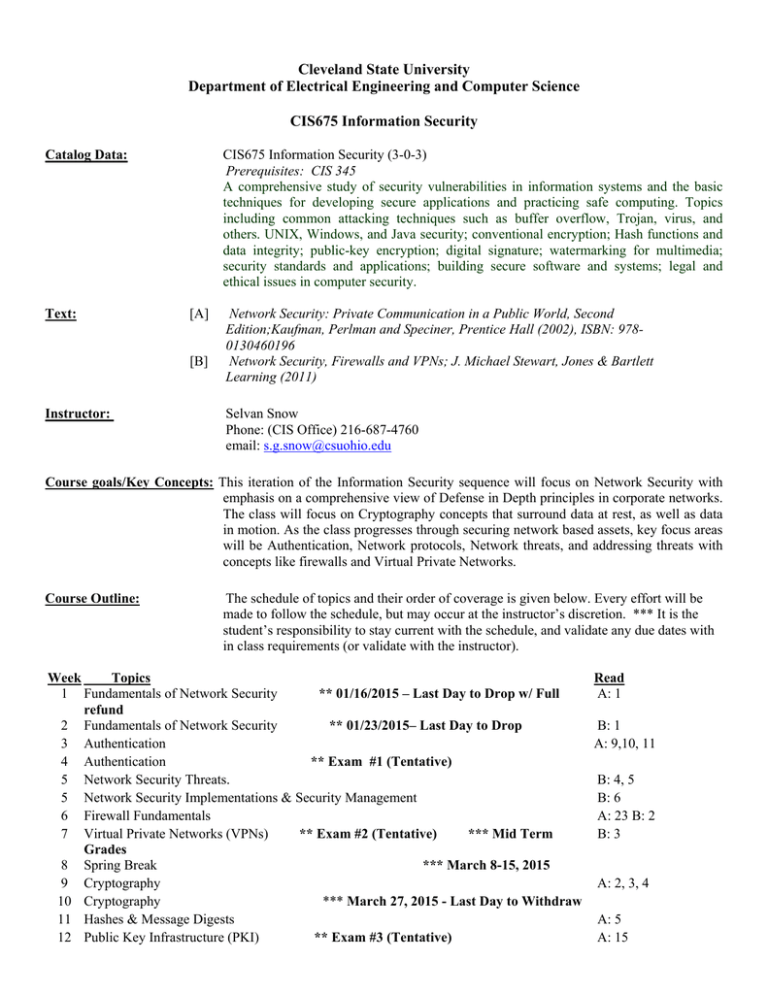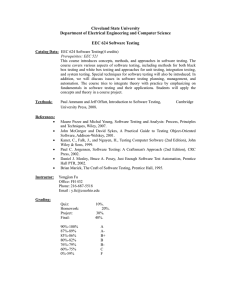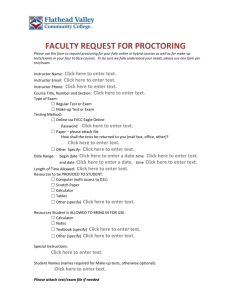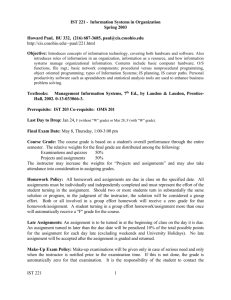Cleveland State University Department of Electrical Engineering and Computer Science
advertisement

Cleveland State University Department of Electrical Engineering and Computer Science CIS675 Information Security Catalog Data: Text: CIS675 Information Security (3-0-3) Prerequisites: CIS 345 A comprehensive study of security vulnerabilities in information systems and the basic techniques for developing secure applications and practicing safe computing. Topics including common attacking techniques such as buffer overflow, Trojan, virus, and others. UNIX, Windows, and Java security; conventional encryption; Hash functions and data integrity; public-key encryption; digital signature; watermarking for multimedia; security standards and applications; building secure software and systems; legal and ethical issues in computer security. [A] [B] Instructor: Network Security: Private Communication in a Public World, Second Edition;Kaufman, Perlman and Speciner, Prentice Hall (2002), ISBN: 9780130460196 Network Security, Firewalls and VPNs; J. Michael Stewart, Jones & Bartlett Learning (2011) Selvan Snow Phone: (CIS Office) 216-687-4760 email: s.g.snow@csuohio.edu Course goals/Key Concepts: This iteration of the Information Security sequence will focus on Network Security with emphasis on a comprehensive view of Defense in Depth principles in corporate networks. The class will focus on Cryptography concepts that surround data at rest, as well as data in motion. As the class progresses through securing network based assets, key focus areas will be Authentication, Network protocols, Network threats, and addressing threats with concepts like firewalls and Virtual Private Networks. Course Outline: The schedule of topics and their order of coverage is given below. Every effort will be made to follow the schedule, but may occur at the instructor’s discretion. *** It is the student’s responsibility to stay current with the schedule, and validate any due dates with in class requirements (or validate with the instructor). Week Topics Read 1 Fundamentals of Network Security ** 01/16/2015 – Last Day to Drop w/ Full A: 1 refund 2 Fundamentals of Network Security ** 01/23/2015– Last Day to Drop B: 1 3 Authentication A: 9,10, 11 4 Authentication ** Exam #1 (Tentative) 5 Network Security Threats. B: 4, 5 5 Network Security Implementations & Security Management B: 6 6 Firewall Fundamentals A: 23 B: 2 7 Virtual Private Networks (VPNs) ** Exam #2 (Tentative) *** Mid Term B: 3 Grades 8 Spring Break *** March 8-15, 2015 9 Cryptography A: 2, 3, 4 10 Cryptography *** March 27, 2015 - Last Day to Withdraw 11 Hashes & Message Digests A: 5 12 Public Key Infrastructure (PKI) ** Exam #3 (Tentative) A: 15 13 Advanced Firewalls B: 7-13 14 SSL/TLS A: 19 15 Advanced VPN B: 11-14 15 IPSEC (Time Permitting) A: 17-18 16 Last Day of Class: May 1, 2015 Final Exam: 5/5/2015: 8 – 10 PM ** Final Exam time is listed as a courtesy; all students must verify the time/location for the final through the academic calendar: http://www.csuohio.edu/enrollmentservices/registrar/calendar/ Expected Outcomes: Upon successful course completion, a student will be able to: Understand Network Security fundamentals and network based threats. Understand and explain Authentication schemes and their use in Network Security. Explain a well-designed and secured corporate Network. Understand Symmetric/Asymmetric Cryptography concepts, and explain its use, benefits, and pitfalls. Understand the use of firewalls and how they are used to provide protocol security. Understand Virtual Private Networks and how they are used for remote access to corporate networks. Grading: The course grade is based on a student's overall performance through the entire Semester. The final grade is distributed among the following components: Homework (4) 25% [200] A = 92-100% A- = 90-92% B+ = 88-90% Exams (3) 37.5% [300] B = 82-88% B- = 80-82%C+ = 78-80% Final 12.5% [100] C = 70-78% D = 60-70% F = 0-60% Daily labs 25% [200] & Quizzes **** Daily quizzes will not be announced before class. ** For more information on University grading standards, please visit the following web site: http://www.csuohio.edu/enrollmentservices/registrar/grades/grades.html Examination and Make-Up Exam Policy: The use of books, cell phones, calculators, and any electronic devices is prohibited during the quiz and examination. Any form of communication during quiz or examination is prohibited, and will result in a failing grade. Ordinarily, no make-up examinations will be given. Make-up examination will be considered only in case of documented emergencies and only when the instructor is notified about the emergency as soon as possible (before the absence). If this is not done, the grade is automatically 0 for that examination. It is the responsibility of the student to contact the instructor for arranging a make-up time. Written verification for the student's inability to take an exam will be required. Homework and Late Homework Policy: Homework programming projects are due at the start of class on the day specified on the assignment. Daily labs are due at the end of class, unless otherwise indicated. An assignment is to be turned in on the day it is due. An assignment turned in later than the due date will be penalized 25% of the total possible points for the assignment for each calendar day late. List of Assignments: TBA Student Conduct: Students are expected to do their own work. Academic misconduct, student misconduct, cheating and plagiarism will not be tolerated. Violations will be subject to disciplinary action as specified in the CSU Student Conduct Code. A copy can be obtained on the web page at: -2- http://www.csuohio.edu/sites/default/files/Student%20Code%20of%20Conduct%20Draft%20for%20Comment_0.pdf or by contacting Valerie Hinton Hannah, Judicial Affairs Officer in the Department of Student Life. Student Expectations: 1. Class participation and regular attendance is expected a. In the case of absence, it is the student’s responsibility to verify with the instructor any due dates or covered material. 2. Students are responsible for bringing themselves up-to-date on class material and assignments 3. All students are expected to read the assigned chapters before attending class. 4. Examinations will be a combination of material presented in lectures, covered in the textbooks, sample programs and class notes 5. Homework and assignments must be completed and submitted in an operational form Additional Resources: All additional resources, and assignments, will be announced through Blackboard Learn: https://bblearn.csuohio.edu/MACAuth/login.jsp Attendance & Registration: Students attending the class session must be registered before the class session and have proof of registration. The student must check with the Advising Center 687-3729 (undergraduate) or 216-687-3730 (graduate) on any discrepancies. Permission for students to sit in or enroll in the class after class has started must be given by the department chair or program head. ** NOTE: The instructor reserves the right to retain, for pedagogical reasons; either the original or a copy of your work submitted either individually or as a group project for this class. Students' names will be deleted from any retained items. -3-




